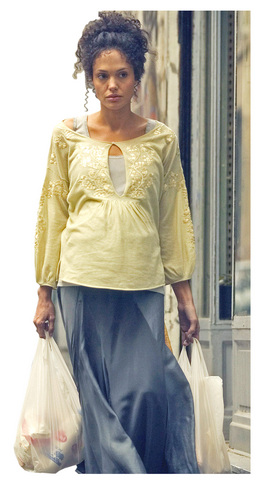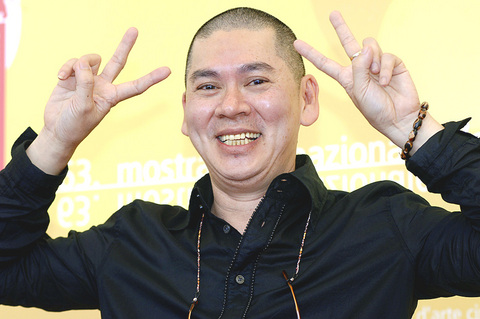The Korean peninsula's leading film festival kicked off yesterday in a southern beach resort town despite growing tensions over the North Korea's recent announcement that it tested a nuclear bomb.
The mood at the 11th Pusan International Film Festival, also one of Asia's most prestigious, appeared unaffected by the diplomatic fallout from the claimed nuclear test. The film festival retains the old spelling of the South Korean city now known as Busan.
Veteran Hong Kong actor-singer Andy Lau, who is being honored as Asian filmmaker of the year, was mobbed by fans as he arrived at the Busan airport late Wednesday.

PHOTOS: AP
Workers added finishing touches to the new PIFF Pavilion, a beachfront complex built with freight containers that houses a conference room, lounges and an outdoor stage for actor appearances.
This year's program, however, includes two timely films about the North. British documentary Crossing the Line tells the story of the last American defector to North Korea.
The German documentary Comrades in Dreams follows the life of a North Korean movie projectionist, comparing it to the lives of counterparts in southern India and Midwestern America.

The Busan festival opens with South Korean director Kim Dae-seung's Traces of Love, a man who can't overcome the pain of losing his lover. Kim wowed audiences with his debut Bungee Jumping of Their Own, a touching and innovative story about a secondary school teacher's relationship with his male student whom he believes to be the reincarnation of an old lover.
Traces of Love features Yu Ji-tae from Old Boy, which won the grand prize at the Cannes Film Festival in 2004.
In all, Busan organizers will show 245 films from 63 countries, including 64 world premieres.

Director Tsai Ming-liang (蔡明亮) and Oscar winner Istvan Szabo from Hungary will give master classes.
Defying government sanctions, rising Chinese director Lou Ye (婁燁) will promote Summer Palace (頤和園), a love story set against the pro-democracy protests in Beijing's Tiananmen Square in 1989. Chinese film authorities banned Lou from filmmaking after he screened the film at Cannes this year without clearing government censors.
Thailand yesterday opened its second film festival this year, but some question the need for two events when the country is struggling to find a niche in the already crowded festival scene.
More than 70 films from 30 countries will be screened at the fourth World Film Festival of Bangkok, and although it may lack the celebrity draw of similar events, organizers say it has loftier aims.
“We want to give the city a serious film culture event,” said festival director Victor Silakong. “Of course, we cannot afford all the big stars but we want to promote serious cinema.”
The World Film Festival of Bangkok follows the Bangkok International Film Festival earlier this year, which boasted stars including directors Oliver Stone and Terry Gilliam and actors Willem Dafoe and Catherine Deneuve.
But Thai film industry experts are perplexed as to why the kingdom needs two festivals, especially when neither of them are close to rivaling Asia's premier film event in Busan, South Korea, let alone Venice or Cannes.
“Why do we need two festivals? I think it eats into their own programming,” said Gilbert Lim, executive vice president of Thai studio Sahamongkol Films.
“I think the resources could be developed together to make one very good film festival instead of two mediocre ones.”
A leafy boulevard in an Indian city stood in for a swish Pakistani neighborhood on Monday as Hollywood star Angelina Jolie began shooting for a film about a US journalist abducted and killed in Pakistan.
The film, A Mighty Heart, is the story of Daniel Pearl, a reporter with the Wall Street Journal who was kidnapped in the Pakistani port city of Karachi and killed in 2002 while researching a report in the aftermath of the Sept. 11 attacks.
It will be shot for a month in the western Indian industrial city of Pune as security concerns prevented filming in Pakistan.
On Monday, filming began in a two-story white bungalow in Pune's Sindh Society locality, which has a striking similarity to the district in Karachi — with its boulevards, row houses and bungalows — where Pearl was staying.
Cars painted yellow to resemble Karachi taxis were parked in front of the house and used for filming.
The Oscar-winning US actress plays the slain reporter's wife, Mariane. Her partner Brad Pitt is the movie's producer.
The celebrity couple's arrival in Pune has thrown the quiet Indian city into a frenzy as hundreds of fans throng their luxury hotel and the shooting locale for a glimpse.

May 26 to June 1 When the Qing Dynasty first took control over many parts of Taiwan in 1684, it roughly continued the Kingdom of Tungning’s administrative borders (see below), setting up one prefecture and three counties. The actual area of control covered today’s Chiayi, Tainan and Kaohsiung. The administrative center was in Taiwan Prefecture, in today’s Tainan. But as Han settlement expanded and due to rebellions and other international incidents, the administrative units became more complex. By the time Taiwan became a province of the Qing in 1887, there were three prefectures, eleven counties, three subprefectures and one directly-administered prefecture, with

Taiwan Power Co (Taipower, 台電) and the New Taipei City Government in May last year agreed to allow the activation of a spent fuel storage facility for the Jinshan Nuclear Power Plant in Shihmen District (石門). The deal ended eleven years of legal wrangling. According to the Taipower announcement, the city government engaged in repeated delays, failing to approve water and soil conservation plans. Taipower said at the time that plans for another dry storage facility for the Guosheng Nuclear Power Plant in New Taipei City’s Wanli District (萬里) remained stuck in legal limbo. Later that year an agreement was reached

What does the Taiwan People’s Party (TPP) in the Huang Kuo-chang (黃國昌) era stand for? What sets it apart from their allies, the Chinese Nationalist Party (KMT)? With some shifts in tone and emphasis, the KMT’s stances have not changed significantly since the late 2000s and the era of former president Ma Ying-jeou (馬英九). The Democratic Progressive Party’s (DPP) current platform formed in the mid-2010s under the guidance of Tsai Ing-wen (蔡英文), and current President William Lai (賴清德) campaigned on continuity. Though their ideological stances may be a bit stale, they have the advantage of being broadly understood by the voters.

In a high-rise office building in Taipei’s government district, the primary agency for maintaining links to Thailand’s 108 Yunnan villages — which are home to a population of around 200,000 descendants of the Chinese Nationalist Party (KMT) armies stranded in Thailand following the Chinese Civil War — is the Overseas Community Affairs Council (OCAC). Established in China in 1926, the OCAC was born of a mandate to support Chinese education, culture and economic development in far flung Chinese diaspora communities, which, especially in southeast Asia, had underwritten the military insurgencies against the Qing Dynasty that led to the founding of